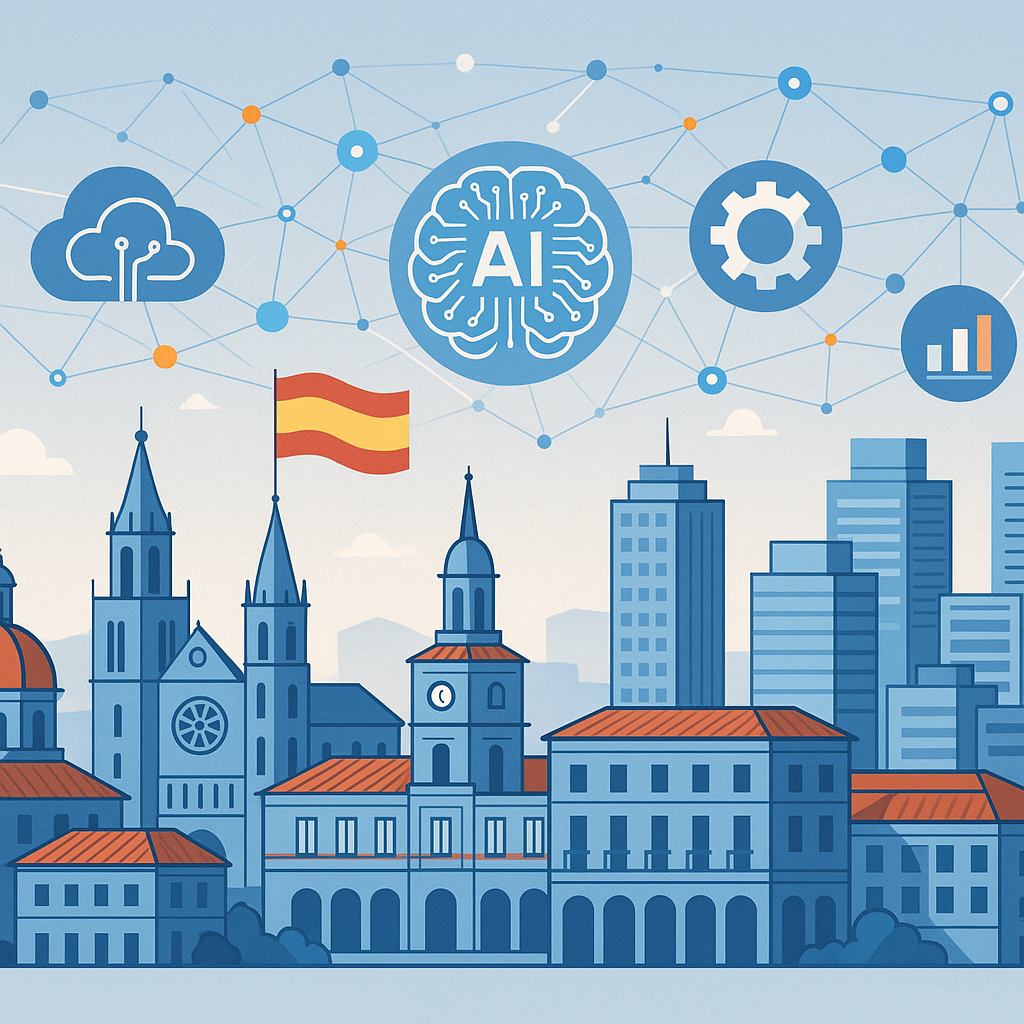Spain lives a fascinating technological paradox. Madrid concentrates more than 300,000 tech jobs and leads Europe in technological talent, but according to the SEIDOR AI Report 2025, only 32% of Spanish companies know how to apply artificial intelligence to gain competitiveness. This gap between potential and execution represents the biggest business opportunity of the decade.
The Spanish Paradox: Leaders in Talent, Lagging in Adoption
The numbers tell a contradictory story. Madrid concentrates 31.5% of national investment in AI and generates almost 300,000 jobs in high-tech sectors. The region is home to one in four of the country’s technology companies, positioning it as Spain’s undisputed tech hub.
However, the Barometer of Artificial Intelligence in Spanish SMEs 2025 reveals that only 2.9% of SMEs use AI, while the KPMG report “Perspectivas España 2025” shows that, although 85% of companies consider AI a strategic priority, most still lack a clear implementation strategy.
This disconnect between intention and action is precisely where the opportunity lies.
Case Studies: Spanish Companies Already Dominating AI
Energy Sector: The Pioneer
Iberdrola, Repsol, Endesa and Naturgy are leading the transformation with AI applied to:
- Predictive infrastructure maintenance
- Real-time energy optimization
- Intelligent management of electrical networks
- Demand forecasting with 95% accuracy
SMEs that Make a Difference
64% of SMEs that have adopted AI report significant improvements in productivity and sales. The most successful cases are concentrated in:
- Automation of administrative processes
- Intelligent chatbots for customer service
- Predictive inventory analysis
- Personalization of shopping experiences
Practical Roadmap: From Pilot to Competitive Advantage
Phase 1: Strategic Diagnosis (Month 1-2)
- Process auditing: Identify where AI can have the greatest impact
- Data evaluation: Analyze the quality and availability of your data
- Definition of KPIs: Establish clear metrics of success.
- Realistic budget: Calculate expected ROI per use case
Phase 2: Controlled Pilot (Months 3-6)
- Select a critical process with abundant data
- Implements a minimum viable solution (MVP)
- Measures results on a weekly basis
- Adjust and optimize based on actual feedback
Phase 3: Smart Scaling (Months 7-12)
- Replicates successes in similar processes
- Integrate systems to maximize synergies
- Form internal teams in AI management
- Develop sustainable competitive advantages
The Regulatory Factor: How the AI Act Can Be Your Ally
With the AI Act’s penalty regime coming into force in 20 days, many companies see the regulation as a barrier. Strategic mistake.
The AI Act (European Regulation on Artificial Intelligence) is the first regulation worldwide that regulates the development, use and commercialization of AI systems according to their level of risk. Its aim is to ensure safe, ethical and respectful use of AI systems in accordance with fundamental rights.
Companies that responsibly adopt AI now will have significant competitive advantages:
- Compliance by design: Systems that comply with regulations from the outset
- Customer trust: Transparency in the use of AI generates loyalty.
- Market access: Compliance facilitates European expansion
- Risk reduction: Reduced exposure to future sanctions
The AI Act is not an obstacle, it is an accelerator for prepared companies.
Predictions 2025: Sectors that will Lead the Transformation
Immediate Winners
- Fintech: Risk analysis and fraud detection
- E-commerce: Personalization and intelligent logistics
- Digital health: Assisted diagnosis and telemedicine
- Manufacturing: Industry 4.0 and predictive maintenance
Emerging Opportunities
- Legaltech: Automation of legal processes
- Proptech: Intelligent property management
- Agrotech: Precision agriculture
- Edtech: Personalization of learning
The Time is Now
Spain has all the ingredients to lead the AI revolution in Europe:
- ✅ Abundant talent: 300,000+ tech professionals
- ✅ Mature ecosystem: Consolidated technology hub
- ✅ Clear regulatory framework: AI Act as a guideline
- ✅ Inbound market: 85% of companies prioritize AI
What is lacking is execution.
Companies that act in the next 6 months will have a 2-3 year competitive advantage over their competitors. The current gap of 32% is not a problem, it is the biggest growth opportunity of the decade.
Will your company be part of the 32% that lags behind or the 68% that leads the future?

